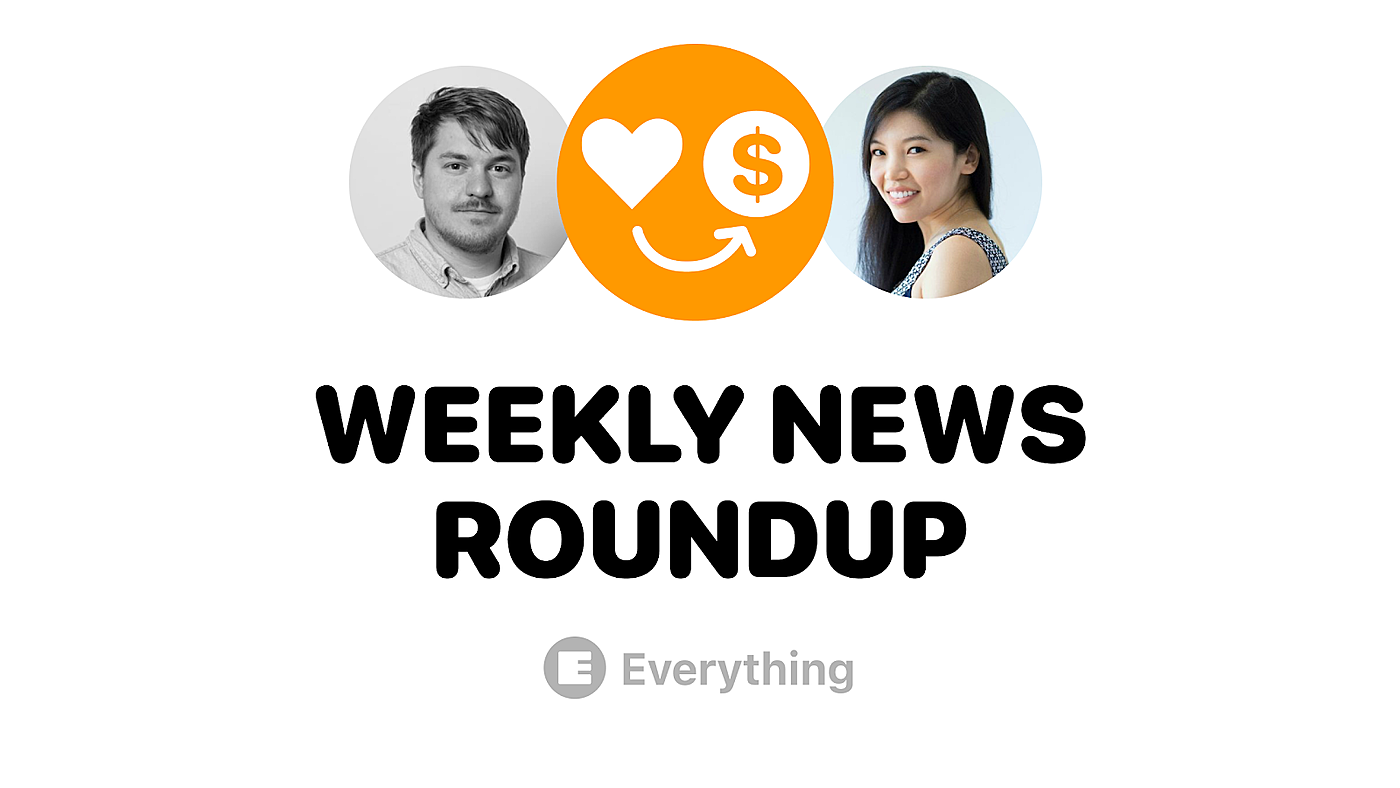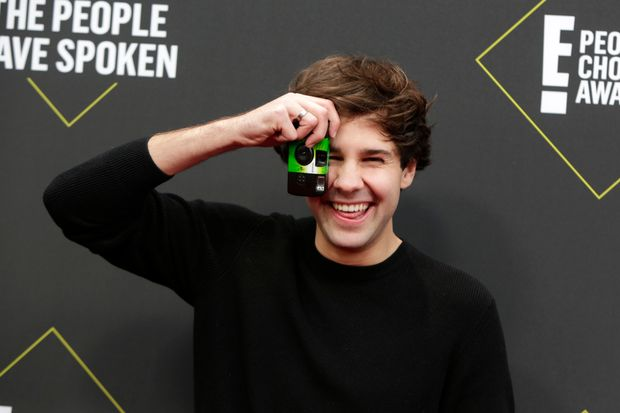
Welcome to Issue #4 of the Means of Creation weekly news roundup where we break down the latest news on the passion economy, including the happenings related to platforms, creators, startups, and trends.
Our first month of the Weekly News Roundup will be a free beta; the goal being to make this the most helpful resource for founders, investors and creators in the passion economy. We’re looking for your feedback to make this happen! (form also linked at the bottom). This issue is the last free news roundup! Subscribe to keep up next week:
Stuff We Published
This week, we published our latest episode of Means of Creation with Dan Teran, founder & former CEO of Managed by Q. Managed by Q is a startup that provides office management services such as office cleaning, IT support, security, supply inventory management, and equipment repair to large companies. Dan founded the business in 2014, and it was acquired by WeWork in 2019 for $220M.
Dan built Managed by Q by operating with the Good Jobs framework, which flies in the face of most gig economy companies' ethos.
Find it as a podcast on Apple Podcasts, Spotify, Overcast, Breaker or wherever you listen to podcasts, or as a video on YouTube here. As always, you can view more episodes and subscribe to the Means of Creation YouTube Channel.
Substack Rankings
A new feature analyzing the Paid Newsletter rankings of Substack. This edition compares Sep 22 to Oct 13.
- Bulwark+, a political newsletter claiming non-partisanship, increased 6 spots from 11th to 5th
- Tipping Point Prophecy Update, a newsletter about biblical prophecy and the End Times, increased 5 spots from 22nd to 17th
- The Message Box, a newsletter about political and message theory, increased 3 spots from 23rd to 20th
- Pulte's Money and Life Thoughts, a newsletter about lifestyle and philanthropy, decreased 7 spots from 15th to 22nd
Top of Mind
NEW MEDIA PLATFORMS; OLD MEDIA STRATEGIES
'Triller Money': How a TikTok Competitor Is Buying Star Power // Taylor Lorenz, NYT
Triller, a TikTok competitor with 65 million active users as of August, is currently spending big bucks to get celebrity creators to migrate from TikTok. Triller is incentivizing them with any resource they need (financial or otherwise) to put out increasing amounts of short-form content on the app. The essay details the extravagant attempts of Triller Executives who have been given free-hand to essentially poach TikTok creators at any cost.
Earlier this year, Triller won the user-acquisition lottery due to the geopolitical turmoil surrounding TikTok across the globe. However, user retention — which Bytedance had perfected over years of algorithmic trial and error — is a completely different ball game. As the company actively tries to bolster it’s algorithm to engage and retain the sudden influx of new users, Triller is using old school business strategies to keep the platform relevant and exciting in the interim.
What’s of particular interest to us here is that these technology platforms are using old media strategies that they are supposedly crusading against. (The article reports that for one creator, Triller actually managed to procure a helicopter! Other examples include Rolls Royce’s, fully comped “creative brainstorming” dinners at Nobu, and other perks.)
“To bring artists on, Triller has been pulling out all the stops. “Triller money” has become a recurring joke among TikTokers in Los Angeles, the punchline being that the company will do whatever it takes to partner with the right stars.”
However, there’s a problem with using this old media business paradigm — the appeal of short-form content platforms such as TikTok is that they enable prosumption. Users both consume content but also feel that there is an even playing field for them to become stars, too. An overemphasis on the acquisition of established creators (instead of building a product that helps emerging ones reach an audience) means Triller will be full of polished, high production value content (think Quibi).
This is a trend we are seeing across the Passion Economy: platforms are willing to pay more for big name (and big audience) creators. We are seeing this in just about every area of the passion economy: Substack has given upfront financial benefits to well-known writers (including Casey Newton); Facebook paid TikTok stars to use Reels; Spotify has inked exclusive podcast deals with Bill Simmons and Joe Rogan in addition to acquiring other podcast studios; and Microsoft’s Mixer platform paid Ninja to stream on their now-defunct platform.
https://twitter.com/nbashaw/status/1288353299217838084
It reminds us of the entertainment model of paying well-known actors handsome sums of money to appear in their movies. These are some early signs that the Passion Economy could actually resemble the media of the past. Instead of assuming the risk themselves, we could see a model more akin to Hollywood where creators are essentially salaried employees, working exclusively on certain platforms and sacrificing freedom for financial guarantees.
There’s also risk that the special treatment some creators are receiving generates resentment among other creators, who feel like the playing field isn’t even (e.g. “Why am I not getting invited to Nobu?”). It’s not always clear why some creators are hand-chosen by platforms while others aren’t. Creators might vary in their monetization potential, but the beauty—in theory—of UGC platforms is that everyone feels that they have a chance to succeed. When that feeling is undermined, the have-nots typically end up flocking to a different platform where they feel they have a greater chance of success.
If content comes from “the top”—then capital will become an increasingly important resource in the creator battleground. The highest bidder will attract the best talent. But if high-quality content comes not from the top, but from everyone, then the algorithms, user experience, and data will end up as the most important resources.
There’s also rumors that Triller is exploring going public through a special purpose acquisition company (SPAC). A SPAC is a shell company that raises money publicly, then uses that money to buy a private business. In the transaction, the private business then trades as a public business. While Triller has only a fraction of the users of TikTok, they are US-based which is especially important considering the government’s recent intervention in TikTok. If they go public, we will have much more information on their size and creator strategy.
SOCIAL CAPITAL => FINANCIAL CAPITAL & POLITICAL CAPITAL
David Dobrik's 'Dispo' Raises $4 Million Seed Round From Alexis Ohanian, Vlog Squad Members, More // Geoff Weiss, Tubefilter
Dispo’s seed round is a perfect illustration of how to convert social capital into financial capital. The company, founded by David Dobrik, recently raised $4 million led by Reddit co-founder Alexis Ohanian and included several celebrities such as Sophia Vergara and The Chainsmokers.
(Photo source.)
David Dobrik has a follower count of 70 million across all platforms and is widely influential amongst the Gen Z demographic. Originally launched as David’s Disposable, the rebranded Dispo allows users to take pictures, then wait a day for the shots to ‘develop,’ akin to a disposable camera. Through Dispo, David wants to restore a sense of authenticity and create a safe online environment — his goal is to tackle some of the problems of social media platforms and their repercussions on mental health. The app has 2.6 million downloads so far.
Clearly these investors seem confident that Dispo will be able to leverage Dobrik’s social capital to drive even more user growth. And it’s not hard to see why: he recently used his signature “car-giveaway” routine to drive a record 120,000 individuals to register to vote.
https://twitter.com/DavidDobrik/status/1313942798903590912
This highlights a key differentiator between consumption patterns in the passion economy and the gig economy: Dobrik’s followers don’t merely follow him, they trust him. His social influence extends far beyond his content channels and into the cultural landscape. In addition to selling t-shirts and hats, he can also sell voting, and that’s something we’ve rarely seen from faceless corporations in the past.
Related Read:
David Dobrik's Tesla Giveaway Was Probably One Of The Largest US Voter Registration Drives—Ever // Abram Brown, Forbes
JOURNALISTIC ENTREPRENEURIALISM
Passion, niche and news institutions: the idea of a journalist is changing again // Charlie Beckett, London School of Economics
Charlie Beckett -- founder of a journalism think tank inside London School of Economics -- published an essay that reflects on the transition of the journalism industry. Prominent writers are starting their own D2C micro-enterprises by leveraging the accumulated expertise and audience they’ve built up at large media organizations. Sometimes journalists split off on their own, but oftentimes they reinvent their career inside legacy publications.
Will Casey Newton’s career trajectory (Journalism School — Local Newspaper — Large Media Outlet — Substack Independence) serve as a blueprint for the future? And what are the fundamental market differences between the United States compared to other countries?
“...this is driven from America where the sheer scale of the news market affords greater potential for smaller scale and even individual enterprises to experiment and thrive. 0.1% of US journalism revenue allows you to run a decent digital news organisation. In the UK, let alone smaller national markets, 0.1% means you will be struggling to pay your bills.”
Amongst journalism students, there is a collective recognition of this transition, but the students have a measured reluctance to change. The role of a journalist as an influencer stands at odds with some of the classical notions surrounding journalism as an impersonal account of facts and information.
https://twitter.com/sophiasgaler/status/1310893130313601024
Relatedly, Ben Smith wrote a piece in the New York Times this week about fellow NYT journalist Rukmini Callimachi not fact-checking sources for a 2018 podcast series about the Islamic State, called Caliphate. In short, Callimachi used a source in the podcast (that provided particularly interesting details) that didn’t check out at the time. Now, the facts are surfacing that this source made up these details.
However there are two interesting points about the article besides the topic itself. First, the article is written by Ben Smith (one NYT journalist) about Rukmini Callimachi (another NYT journalist). We expect to see more of this as audiences start to gather for writers instead of just publications. And second, we will continue to see organizations struggle with the checks and balances of star journalists. If an individual brings in a large audience, an organization might be tempted to give them more factual leeway.
We loved this quote in particular that sums up the changes the NYT is going through: “The paper is in the midst of an evolution from the stodgy paper of record into a juicy collection of great narratives, on the web and streaming services.” It’s worth asking the question, is the New York Times a journalistic newspaper, or a star-driven media company?
ICYMI:
Creator revenue diversification: a YouTube influencer with 12 million subscribers shares how their revenue breaks down // How does Linus make money? - 2020 update // Linus Tech Tips, YouTube
- Linus Tech Tips is a widely popular YouTube channel that creates product reviews, unboxing videos, and other content related to the tech industry through associated channels such as TechLinked and ShortCircuit. In this video, founder and CEO Linus Sebastian breaks down the company’s various revenue streams (08:55) which includes merchandise, the Amazon affiliate program, early access videos (through a platform he owns called Floatplane), video sponsorships, YouTube AdSense, and more. While the majority of Linus’ revenue comes from sponsorships & advertising, the main takeaway for creators is to diversify your revenue streams to mitigate the risk that comes with an overdependence on any single channel. The video also raises interesting questions concerning the scalability of enterprises in the passion economy as Linus Media Group is a full-blown media company supported by 29 employees.
Sophisticated Wall Street Investors Turn to r/wallstreetbets for Alt Data // Wall Street and Big Investors Are Dying to Know What Amateur Traders Are Doing // Sarah Ponczek, Bloomberg
- Retail trading has seen a huge boom ever since the pandemic forced people indoors and platforms such as Robinhood made investing frictionless and accessible. This change has prompted many amateur investors to dive in: the percent of equity option volume from one-lot trades (investors who trade a single contract, a reasonable proxy for small-pocketed retail investors) more than doubled from ~5% in Jan 2019 to ~12% in Sep 2020. This has led to bigger, more sophisticated investors scraping and analyzing data from channels such as r/wallstreetbets to predict their effects on retail investing.
Perspective From a Top 0.03% OnlyFans Creator // AMA about the economics driving OnlyFans // @Aella_Girl, Twitter
- OnlyFans creator Aella answers questions related to her experience on the platform, the consumer and creator psychology, and the economics of serving niche audiences. One interesting thing that came from moving to OnlyFans was the diversification of her customer base: on a webcam site, she was making 80%+ of her income from 3 people, whereas she now estimates only 3% of her income comes from her top 3 customers. She credits the difference to the public nature of cam sites leading a small number of wealthy people to publicly bid up tips, while the rest of the customers don’t engage at all. OnlyFans removes this competitive market dynamic by keeping payments private, thus allowing creators to diversify their customer base.
Passion Economy Financings:
- Shogun raised $35 million Series B led by Accel; with Initialized Capital, VMG Partners and Y-combinator. Shogun helps individuals and brands build ecommerce websites on top of backend platforms such as Shopify, BigCommerce or Magento.
How did you feel about this post?
We read every piece of feedback, so share anything that comes to mind!
Enjoy reading this? Sign up for Means of Creation! It includes:
- The Means of Creation talk show every Friday at 11:00am PST / 2:00pm EST featuring founders and investors in the passion economy. Recent guests include Dan Teran, Ankur Nagpal, and Joseph Cohen.
- Passion Economy News (you’re reading it now!) where we break down the latest news on the passion economy — platforms, creators, startups, and trends. This is currently in beta, but next week it will be for premium members only.
- Everything else in the bundle, including great stuff from Divinations (on strategy) Superorganizers (on productivity), Napkin Math (on investing), and Praxis (from the inimitable mind of Tiago Forte). And we’re adding new stuff all the time!
The Only Subscription
You Need to
Stay at the
Edge of AI
The essential toolkit for those shaping the future
"This might be the best value you
can get from an AI subscription."
- Jay S.
Join 100,000+ leaders, builders, and innovators

Email address
Already have an account? Sign in
What is included in a subscription?
Daily insights from AI pioneers + early access to powerful AI tools











Comments
Don't have an account? Sign up!